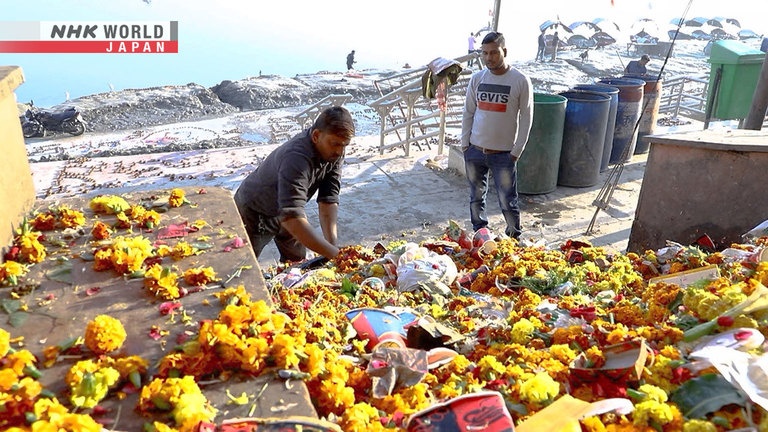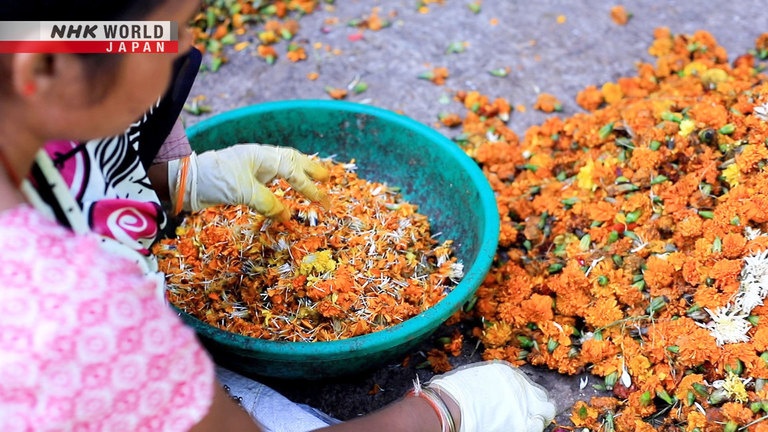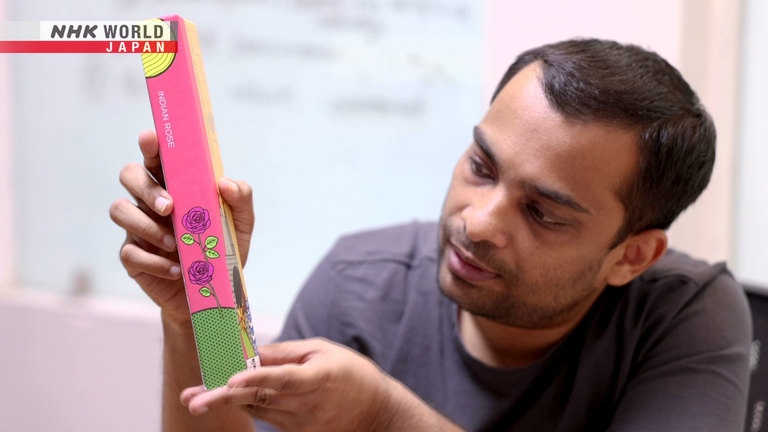Sacred Flowers, Sacred River: Ankit Agarwal / Founder & CEO of Phool
To avoid pollution, a business has started transforming the huge number of temple flowers discarded into the Ganges River into incense. It's a model of circular economy that respects local customs.




Transcript
Direct Talk
A major problem has been besetting
India's holy river, the Ganges.
You see the flowers floating
on the surface of the water.
There's concern that the flowers
used in religious services at temples
are causing pollution.
Ankit Agarwal,
the founder and CEO
of a start-up company in India,
rose up to tackle this issue.
He has developed incense made from flowers.
So these incense that we are making from
the flowers are again used to worship gods.
So it's a full cycle.
What are his ideas for
creating a sustainable society?
Let's hear what he has to say.
Sacred Flowers, Sacred River
My name is Ankit Agarwal.
I am the founder of Phool.co
We are the world's first company
which collects temple waste in India
and converts them into organic products.
So it's been five years now with Phool.
We collect around 11 tons of flowers
every single day in two cities.
One is Kanpur, second is Varanasi.
And we convert these flowers into
the world's first charcoal-free incense.
Ankit's company is based in
Kanpur in northern India.
It's an industrial city
located on the banks of the Ganges.
Ankit, who was born and raised in the city,
founded his company in 2017.
It's named Phool,
which means "flower" in Hindi.
So what was his motivation
for starting up the business?
Back in 2015,
I have a Czech friend.
His name is Jacob.
He had come down to India.
So I took Jacob to the
guards of the river Ganges.
Luckily, unluckily,
that day it was an Indian festival
called Makar Sankranti.
And the water was so dirty
that we didn't even want to touch it.
He then finally said that,
"Why don't you do something about it?"
I was like, "Boss, this is India.
This is the Ganges.
This is not Europe.
We can't do anything about it."
And the moment I said this,
a nearby temple dumped
truckloads of flowers in the water.
And I was amazed.
I have seen my parents
put temple waste in the river
or my grandparents did the same.
Everyone I know
puts the temple waste in the river.
No one had ever questioned
the practice before,
and no one had even
thought of river pollution.
At that time, Ankit was working for a
foreign affiliated company
as an automation scientist.
He then spent six months
conducting research
and confirmed the problem of pesticide-laden
flowers being discharged into the river.
All these flowers, just to meet
the sheer demand of flowers,
the farmers use pesticides and
insecticides to grow these flowers.
What happens is these flowers
that are loaded with pesticides,
they get into the river,
mixes with the river water,
then the same water leaches into
the groundwater, causing irreversible damage.
And this is one of the leading causes of
severe diarrhea, hepatitis
across India and Bangladesh
and affects lives of 20 million people.
Approximately 8 million tons of flowers
are washed down the Ganges River every year.
In order to help solve the problem,
Ankit has developed his incense.
We convert these flowers
into the world's first charcoal-free incense.
We have invested
more than a million dollars
into the world's first
dedicated R&D for temple waste.
Because generally incenses
are made from charcoal.
So if we could replace charcoal somehow,
that could really change the game.
The incense-making begins at the temple.
The company staff visit 12 temples
in the city every day to collect the waste
from religious events.
They take it on trucks
to the company's facility
and separate the flowers from the trash.
The flowers are divided by type and
finely broken down into petals.
Then the pesticides
on the flowers are removed.
So then we tried and
picked up elements from them
which could offset all these elements
in the insecticides and pesticides.
So a very simple principle
like for example,
your iodine gets offset with the compounds
present in the seeds of the black plum.
Then these flowers are sprayed with
our own organic bioculum to offset
any pesticide residue that might be there.
This bioculum is a proprietary.
This thing, we have never
released the formula out.
Then these flowers are thoroughly washed.
The petals are dried for several days
and then turned into powder.
To complete the incense,
the clay-like flowers are
wrapped around wooden sticks,
dipped in essential oil, and scented.
So "flowercycling" is a word
that I had coined
to explain like
I combined flower and recycling
that became flower recycling.
That is like that's the logic behind it.
And today we have like this
we have a trademark over this term.
In fact, there was a deeper reason
for transforming flowers into incense.
So first, let me explain
why we used to put
temple flowers in the river.
The thing is, once these flowers have been
offered to the gods, they become sacred.
And anything that is offered to the gods
cannot be disposed in the dust.
It needs to be respected.
And that is why they were
put into River Ganges or other rivers,
because these rivers are
also considered sacred.
In our Phool operations,
we ensured that these
temple flowers are respected.
No one steps on them
like we don't touch them.
We don't keep our feet on them.
They are treated with very sanctity.
In the Hindu Aarti,
there is this line in our Hindu prayers.
There's this line which says,
"Tera tujhko arpan," in Hindi.
In English, that means is
what belongs to the gods
goes back to the gods.
So these incense that
we are making from the flowers
are again used to worship gods.
So it's a full cycle.
So generally people like the idea very much
that instead of putting polluting
the river or something,
it is again going back to the gods
and then these incentives are
healthier than your normal incense.
Flowers offered to the gods are
used again as incense at religious events.
The company currently produces
16 different types of incense,
and they are sold mainly through
retail stores at home as well as online.
The business has now taken off.
However, when Ankit launched his activities,
many doubts were apparently expressed.
See, the first thing was
like the disbelief that was there
because everyone felt this was madness.
Like, why would I start?
Like, "Why would you start cleaning temples?"
"You have a good job."
So that was the biggest thing.
Even my own family, they felt very cheated.
They felt that they'd spent money
on my education, everything.
And now I'm trying to
clean temples, wasting all of that.
So that was one.
And no one had seen any product come out of
temple waste at that point of time.
So see, the first temple or like,
I used to go on
and do collecting kilos of flower,
bring it back on my scooter.
And so they were like the priest or friend
or he's a small boy trying
like I was 26 then.
He was always trying to do
something with like support it.
So and he always said that
"Don't misuse these flowers."
I said, "I will do nothing wrong
with them, don't worry."
And when I showed him the first product
made from the flowers, the incense,
and I said that "You can operate with it,"
he was very, very happy.
When he had built up trust
through steady efforts,
unexpected collaborators appeared.
These are women who have been
disadvantaged by the status system
that once existed in India.
So we generally hire like now, we have,
we hired women who were
from the scavenger community.
So the backstory is that
when I started working right,
I didn't have resources.
I used to work like about 30 kilometers
away from the main city.
And it was very difficult for me
to get people to work.
Then suddenly what happened?
There were these two ladies who came for work
and they were regular for a week.
The ladies told me
that they come to like there are three things
that makes them work with me.
That was one is that they didn't have to
go to ten places to clean the bathrooms.
Second was, I used to
pay them on a daily basis
rather than giving them,
holding their pay for a month,
or giving them leftover food.
And the third was they said that
they like this work
because this is gods' work,
because they said we can't go afford
to offer all these things to the gods,
but at least we are happy to
clean the temples and everything.
Since then it has been
our mission and vision,
to clean the River Ganges
through women's livelihoods.
The company now has
more than 100 female employees.
What do they think about their work?
I love flowers. I like them so much!
I'm happy I get to play with flowers here.
The pick-up and drop-off bus service is very
convenient for the women working here.
Thanks to this work, I've bought many items
for home and been able to build my house.
Ankit's passion is also evident
in the company's packaging.
The lady represents the people
who are making this incense
This represents the temple
and these represent the Ganges water.
And this is the fragrance.
Like, for example, this is rose.
So this represents the fragrance.
Like, see, we didn't have a lot of resources
in terms of money,
in terms of distribution power.
So I find the only thing that
can help me grab eyeballs is the design.
So that was the first experiment
like your organic stuff can be vibrant,
it can be beautiful.
So that is why you see
a lot of colors on the packaging.
I felt that why not try and
use this contemporary design
and let's see if it works or not.
So thankfully it does work.
Ankit is contributing to the
development of the local community
as well as preserving
the environment and traditions.
His efforts are now attracting attention
from abroad as a model of a circular economy.
Recently, the company has been
actively developing new products,
such as this white leather.
It is the microorganisms that feed on
the petals that create the material.
It's called "Fleather,"
by compounding the words
"flower" and "leather".
Research is underway to see if
it can be used as a leather substitute.
Ankit continues to search for the realization
of a sustainable society
in a variety of ways.
What is it that he values most?
I think it's very simple.
The bottom line is that
you don't hurt anyone's sentiment
and you don't hurt, you respect the religion.
You respect the local customs and the people.
So I feel we have ensured
that we never crossed that thin line
of disrespecting our religion,
disrespecting our gods or the temples.
It's a very clean way of working.
As the business grows, it becomes
tougher and tougher every single day.
So as the size of operation grows
and everything, it becomes tough.
Yeah, every day
you leave something,
you feel, "No, this is not going anywhere.
What am I doing?" And things like that.
But then you collect yourself
and you keep on improving, improving, see.
So every business has them.
Like when you're starting something,
everything has highs and lows.
So I try and keep to remember the highs
because lows there are so many lows, right?
So high is what you live on
and then you continue,
keep on continuing what you do.
And for me, it's like any business
needs to do good for the society,
apart from just creating wealth
for the stakeholders.
Only if you see history.
Only businesses that do good
have like survived the test of time.
Finally, we asked Ankit
to tell us his motto.
So I have written,
"Strive hard and be patient.
Good things take time."
If you are trying to change certain things
and if you are targeting
something big, then it takes time.
Even if you work hard, you wouldn't,
there's a possibility that
you don't see immediate results.
So you have to work hard and be patient
and good things take time as well.